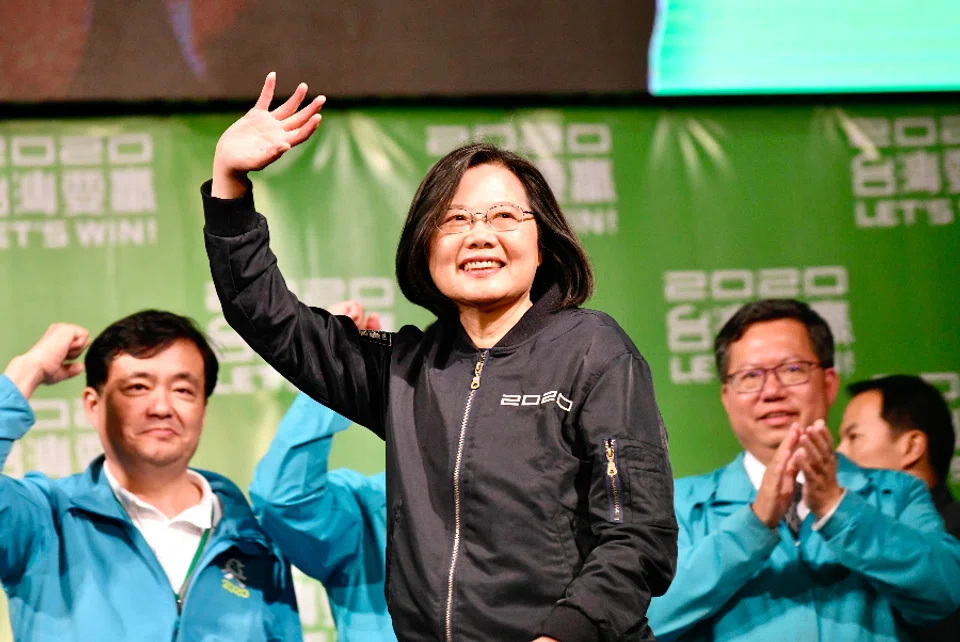Taiwan election: Anti-mainland sentiments and zero cross-strait interaction will continue
On Saturday, Taiwan voted in its presidential election, with incumbent president Tsai Ing-wen of the Democratic Progressive Party returned to office with a resounding 57% of votes, defeating the Kuomintang's Han Kuo-yu. Ng Soon Kiat analyses the results and what it means for Taiwan politics.

In the wake of Hong Kong's anti-extradition protests, sentiments against mainland China were evident in yesterday's Taiwan presidential election. The ruling party, which one year ago was in tatters, made a strong comeback, with president Tsai Ing-wen winning a second term with record-high votes, and the Democratic Progressive Party (DPP) sweeping most seats in the Legislative Yuan and once again claiming majority rule.
Zero cross-strait interaction will continue
With Tsai and the DPP in office for another four years, icy cross-strait relations are expected to continue. Most analyses hold that zero cross-strait interaction will prevail, with no improvement in relations.
Cross-strait relations were the focus of Tsai's victory speech last night. Accompanied by her running mate William Lai and others at a press conference with international media, Tsai emphasised that her commitment to peaceful and stable cross-strait relations "remains unchanged", and said loud and clear to Beijing that "peace, parity, democracy, and dialogue" is the only way to bring both sides closer.
Tsai said: "I also hope that the Beijing authorities understand that democratic Taiwan, and our democratically-elected government, will not concede to threats and intimidation. Positive cross-strait interactions founded in mutual respect are the best way to serve our peoples. The results of this election have made that answer crystal clear."

In late 2018, due to poor governance and unpopular reforms, Tsai and the DPP lost heavily in the local elections. Now, they have staged a comeback under the banner of "safeguarding the country and Taiwan" (护国保台), which means sovereignty and cross-strait issues have risen above pragmatic topics such as bread-and-butter issues and the economy.
Professor Yen Chien-fa of the Chien Hsin University of Science and Technology said, "This big win for Tsai Ing-wen shows a gradual 'greening' of Taiwan voters... future elections will be increasingly influenced by cross-strait relations."
Before the election, there were comments that it was a tussle between the pro-US and pro-China camps. Responding to media queries last night, Tsai said only that this election was a choice between having freedom and democracy, or otherwise.
While Tsai avoided directly commenting on Taiwan-US relations, US Secretary of State Mike Pompeo released a statement on behalf of the US government congratulating Tsai. He thanked her for her leadership in developing a strong partnership with the US, and applauded her commitment to maintaining cross-strait stability "in the face of unrelenting pressure".
He said: "We also congratulate Taiwan for once again demonstrating the strength of its robust democratic system, which - coupled with a free market economy and a vibrant civil society - makes it a model for the Indo-Pacific region and a force for good in the world." He also said that the American people and the people of Taiwan are not just partners, but "members of the same community of democracies, bonded by our shared political, economic, and international values".
DPP wins more than half of Legislative Yuan seats
Tsai won 8.17 million (57.1%) votes, which is more than the 6.89 million votes she won in 2016 to become Taiwan's first female president. This result vaults over the bar of 7.66 million votes set by former president Ma Ying-jeou in 2008 at the height of his popularity, making it the highest number of votes garnered in the history of Taiwan's elected presidency.
The DPP also secured 61 seats in the Legislative Yuan, once again winning a clear majority and confounding expectations.
Heavy defeat for Kuomintang
In contrast, the opposition Kuomintang (KMT) fell from its peak during the 2018 local elections, with Kaohsiung mayor Han Kuo-yu claiming 38.6% of the votes but losing by 2.64 million votes. And although the KMT won 38 Legislative Yuan seats - three more than previously - it did not do well in the constituency elections. It failed to break through the Green camp in Kaohsiung where Han is mayor, while former Taichung representative Yen Kuan-heng lost his Legislative Yuan seat to Chen Po-wei of the Taiwan Statebuilding Party. Even Taipei representative Lee Yen-hsiu, despite her strong grassroots position, was defeated by the DPP's Kao Chia-yu.

Looking at the whole of Taiwan, the whole area south of the Zhuoshui River is still all "green" territory, with no sign of "blue". The Legislative Yuan seats for Yunlin, Chiayi, Tainan, Kaohsiung, and Pingtung, are all held by the DPP.
As the "mother hen" leading the troops, at the KMT's Kaohsiung office last night, Han could not help but feel responsible. Accompanied by running mate Simon Chang and wife Lee Chia-fen, a sombre-faced Han took the stage at about 8:40pm to concede the election. "I can only say I didn't work hard enough and let everyone down."

KMT chairman Wu Den-yih, who promised to lead the Blue camp back into office, took responsibility for his party meeting its Waterloo. He announced at 9pm last night that he will resign along with other top-ranking executive party members.
With the DPP claiming more than half the Legislative Yuan seats, it will be more difficult for small parties to become a key political force. Although the Taiwan People's Party (TPP) led by Taipei mayor Ko Wen-je won 1.5 million votes, enough to be assigned five non-constituency seats in the Legislative Yuan as the third largest party, Ko lamented that the TPP can only be an insignificant minority.
Current representative Huang Kuo-chang of the New Power Party (NPP), despite being ranked fourth among his party's candidates and the NPP winning over 5% of votes, will not have a Legislative Yuan seat, as the party did not go beyond its previous three non-constituency seats and was squeezed out by the TPP.
Yesterday's voter turnout was 74.90%. This is a marginally higher percentage than the 74.38% achieved in the 2012 presidential election.



![[Photos] Fact versus fiction: The portrayal of WWII anti-Japanese martyrs in Taiwan](https://cassette.sphdigital.com.sg/image/thinkchina/3494f8bd481870f7c65b881fd21a3fd733f573f23232376e39c532a2c7593cbc)

